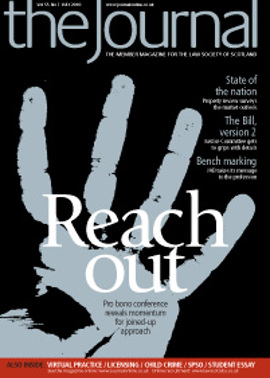Scottish Solicitors' Discipline Tribunal
Section 42A appeal – Rory Cradock
An appeal was made under s 42A of the Solicitors (Scotland) Act 1980 by Rory Cradock, solicitor, Aberdeen (“the appellant”) against a finding of inadequate professional service by the Council of the Law Society of Scotland and a determination and direction that the appellant’s former firm should not be entitled to charge fees in relation to a transaction and that any such fees should be refunded, and that the appellant’s former firm should pay the sum of £1,000 by way of compensation to the client in addition to the costs incurred by the client in the rectification of the defect in the conveyancing complained of.
The Tribunal reserved judgment in relation to the preliminary plea of time bar in respect of the second head of complaint until the conclusion of the appeal hearing and allowed the parties to lead oral evidence at such hearing as they think fit. The Tribunal resolved that a hearing be allowed in respect of the appeal on a date to be fixed, and with regard to the issue of compelling witnesses, directed the parties to the provisions of para 12 of sched 4 to the Solicitors (Scotland) Act 1980.
The Tribunal noted that it was normal procedure for s 42A appeals to be conducted by debate. The Tribunal was satisfied that having regard to the terms of para 11 of sched 4 to the 1980 Act, the parties in the case, particularly the appellant, might insist on requiring evidence to be led as set out therein. Accordingly, the Tribunal allowed the parties to lead oral evidence at the substantive hearing as they think fit.
In connection with the issue of compelling witnesses to attend, provisions are contained in para 12 of the schedule. The Tribunal accordingly deemed it inappropriate to consider at this time the issue of ordering the Society to reveal the identity of the reporter and the convener of the client relations committee who considered the matter. The Tribunal considered that this would be a matter to be decided by the sheriff court if an application was made by the appellant in terms of para 11. The Tribunal reserved judgment in connection with the preliminary issue of time bar.
Russell Craig Livingstone Taylor
A complaint was made by the Council of the Law Society of Scotland against Russell Craig Livingstone Taylor, solicitor, Aberdeen (“the respondent”). The Tribunal found the respondent guilty of professional misconduct in respect of his breach of rules 4(1)(a), 8(4) and 9 of the Solicitors (Scotland) Accounts etc Rules 2001, his failure to stamp and record dispositions for his clients within a reasonable time, his failure to record standard securities for his clients within a reasonable time, his failure to be wholly honest with the Society, his falsification of title deeds and reports on titles to lenders to his clients, his falsification of the purchase price in dispositions, his failure to disclose to lenders to his clients that certain transactions were onward sales, that certain transactions were between connected persons, and that in certain transactions his clients had not paid the full purchase price, his failure to act honestly in his dealings with fellow agents, his failure to ensure the accuracy and integrity of his firm’s accounting system, his failure to ensure that his firm did not act for both parties in a conveyancing transaction, and his failure to be wholly candid with fellow agents.
The Tribunal ordered that the name of the respondent be struck off the Roll of Solicitors in Scotland.
The respondent did not lodge answers and did not appear at the Tribunal. The Tribunal heard evidence from four witnesses and was satisfied that the majority of the facts in the complaint were proved beyond reasonable doubt and that the respondent was guilty of professional misconduct in respect of the majority of the averments in the complaint.
The Tribunal was gravely concerned by the respondent’s conduct in this case. He had failed to run a professional practice and his actions had persisted over a period of time. The respondent had deceived clients, fellow agents and lenders in an organised way. This sort of action was bound to bring the profession into disrepute. The respondent had not given any explanation for his actions, which were regrettably disgraceful and dishonourable. They amounted to a systematic scheme of falsification and non-recording of deeds, which taken together with his inaccurate accounting, which concealed the true nature of the transactions, made this one of the more serious cases that the Tribunal had had to deal with in recent years.
The Tribunal also noted a previous finding of professional misconduct against the respondent when he was suspended for a period of six years. The Tribunal found that the respondent was not a suitable person to remain on the Roll of Solicitors in Scotland.
[Publicity was deferred in this case due to ongoing criminal proceedings. On 13 May 2010, the Tribunal resolved to now give publicity to this case.]
In this issue
- Drop everything
- Free to give
- For the common good
- "Not for the likes of me"?
- RoS fees up for review
- Taking shape
- Criminalising children
- Split decision
- A picture's worth a thousand words
- "Duty to trade" revisited
- Law reform update
- From the Brussels office
- Join the cloud
- Combating claims in interesting times
- Ask Ash
- Party confidential
- What fresh hell is this?
- Links with the past
- Stranger than fiction
- Acts of kindness
- Scottish Solicitors' Discipline Tribunal
- Website review
- Book reviews
- Service driver
- Forecast: cloudy






